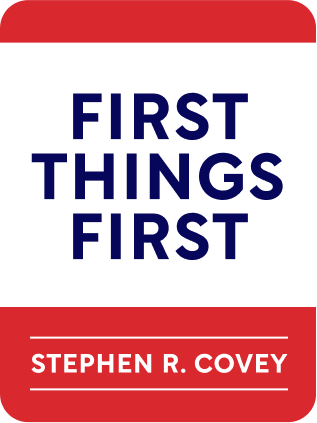

This article is an excerpt from the Shortform book guide to "First Things First" by Stephen R. Covey. Shortform has the world's best summaries and analyses of books you should be reading.
Like this article? Sign up for a free trial here .
What is the Stephen Covey interdependence paradigm in the context of time management? How can it help you manage your time more effectively?
According to Stephen Covey, interdependence is a paradigm that is central to the fourth generation approach to time management. It states that we should manage our time in consideration of the interconnectedness of the things we spend it on.
Keep reading to learn about the Stephen Covey interdependence paradigm.
Understanding the Stephen Covey Interdependence Paradigm
Consider these questions:
How much time and energy do you spend dealing with Quadrant I problems that became urgent because of miscommunication or misunderstanding with someone else?
How much time and energy do you spend on Quadrant III tasks because they’re important to other people and you confuse that with being important to you?
How much time and energy gets wasted in your family or company because of people miscommunicating, misunderstanding each other, or blaming and accusing each other?
How much more time effectiveness and quality of life could you and the people around you enjoy if you were all able to work together to capitalize on everyone’s unique talents and creativity?
Traditional time management techniques are based on a management and control paradigm that causes you to see other people in a transactional way: They’re either tools for delegation or interruptions to your schedule. But this view ignores the potential of creating synergy with others in order to achieve both your and their goals more effectively.
The fourth-generation approach to time management takes a transformational view of interdependence, applying the skills you’ve practiced to create synergy among your roles and goals to your interactions with the people around you.
Stephen Covey: Interdependence, Roles, and 4 Human Needs
According to Stephen Covey, interdependence is a principle that permeates all aspects of our life. This extends to personal priorities, roles, and our basic human needs.
Think of your first things, the most important things in your life. Most of them relate, in some way, to other people: Your goal of good health and financial security likely connects with your desire to enjoy a high quality of life with your friends and family.
Your roles as a parent, spouse, sister, daughter, employee, friend, or community member exist in the context of other people — your child, spouse, brother, parents, boss, friend, and community.
Your goals and accomplishments are interdependent. Although you may work independently to achieve your goal, often you’re using knowledge you’ve learned from others or some other asset that’s come from the work of others.
Even fulfilling your own essential human needs is interdependent:
- The physical dimension — which encompasses both health and financial security — depends on medical providers to keep you in good health and your job as a source of income.
- The social dimension is, of course, interdependent, based on your relationships and interactions with others.
- The mental dimension requires you to continually learn and grow, which often involves learning from the writings and lessons of others or gaining insights through interactions with other people.
- The spiritual dimension is all about contributing to society for the benefit of other people.
The Paradigm of Independence
Our society tends to overvalue independence, seeing success as the achievement of the individual, and traditional time management approaches reinforce that paradigm.
Independence is important; it allows you to develop the strength of character to disregard external factors, such as the social mirror and other people’s onions, in order to act with integrity in moments of choice. But focusing on independence at the expense of interdependence is costly.
The Price of an Independence Paradigm
A paradigm of independence creates great imbalance in our lives.This paradigm goes hand-in-hand with a linear, chronos (clock time-oriented) paradigm, which leads to the feeling that there’s only so much time to achieve and experience all that life has to offer; as a result, people with this paradigm focus on production to the neglect of nurturing and maintaining production capability.
- On an individual level, an independence paradigm causes you to try to meet your four human needs in a rushed, efficiency-oriented way.
- On a physical level, rather than dedicating the time necessary to maintain a healthy, active lifestyle, you eat what you want and burn the candle at both ends, relying on doctors to help fix the resulting issues.
- On a social level, you feel too pressed for time to develop relationships that are deep and rich.
- On a mental level, you take a superficial approach to learning, focusing on skills, methods, and quick-fix techniques instead of underlying foundations and principles.
- On a spiritual level, you make superficial contributions to causes and society, but your effort lacks a deep commitment and sense of purpose.
Stephen Covey’s Interdependence Paradigm
In contrast to the paradigm of independence, the paradigm of interdependence states that individuals can’t live independently of the vast ecology formed by human relationships. We necessarily depend on each other to live, work, and thrive. According Stephen Covey, interdependence paradigm is characterized by three principles:
1. Public Behavior is the Result of Private Behavior
The problems we think of as “public problems,” such as those in organizations and society as a whole, are the result of individual choices. Many people blame “the system” without acknowledging that the system is created by individuals.
For instance, family systems like marriages collapse not because marriage itself is flawed, but because the individuals in the marriage aren’t making principle-centered decisions. Generally, you can trace problems in families, companies, and society back to the principles and choices of individuals. Therefore, these public problems are actually private problems.
2. Life Can’t Be Compartmentalized
You may think that you can keep your private life separate from your public life, but if you’re having personal problems, they’re going to show up at work, no matter how good you are at your job. For instance, if you’re continually arguing with your spouse, you’ll come to work tired, short-tempered, and distracted. You need to make principle-centered decisions in your private life if you want to be able to make principle-centered decisions in your public life.
3. Trustworthiness Leads to Trust
Trust is essential to effective communication and positive relationships, and therefore essential to public life. But trust starts in the personal sphere of the individual, with trustworthiness. If people aren’t trustworthy, there’s no way to build trust among them, and relationships and systems collapse.
For instance, if your employer speaks negatively to you about another employee, the employer is demonstrating that he can’t be trusted to support his staff in their absence. He’s showing his untrustworthiness. Even if he hasn’t said negative things about you, you can no longer trust him. The strength of the social glue of trust depends on the trustworthiness of individuals.
Redefining What’s Important
Shifting from a paradigm of independence to a paradigm of interdependence changes how we choose to spend our time. We start asking questions like:
- Is my goal to get this task done efficiently? Or is my goal to empower my employees to do it?
- Is my goal to control others? Or is my goal to help them tap into their creative potential?
- Is my goal to manage conflict? Or is my goal to make communication effective so we avoid conflict in the first place?
The fourth generation of time management focuses on people rather than things and acknowledges that control is an illusion. It’s more effective to focus on Quadrant II activities like building relationships and setting group goals than trying to control every aspect of your calendar. It takes courage to step away from the illusion of control and focus on interdependence. But your four human endowments can give you that courage.
Interdependence and the Four Endowments
The four human endowments are the key to accepting vulnerability as an asset and shifting to a paradigm of interdependence. Again, the public sphere is built on the private, and our relationships depend on our own personal integrity.
- Your self-awareness allows you to be aware of others as well. Instead of thinking of others in terms of what they can do for you, you attempt to understand them.
- Your conscience gives you an awareness of the collective conscience. You find satisfaction in establishing a shared vision with your family or team, and you enjoy working toward “true north” together.
- Your independent will allows you to form an interdependent will with others. You find opportunities to create “win-win” solutions.
Your creative imagination contributes to the collective imagination of the group. You find that, together, you can come up with more creative and effective solutions to problems than you could on your own.

———End of Preview———
Like what you just read? Read the rest of the world's best book summary and analysis of Stephen R. Covey's "First Things First" at Shortform .
Here's what you'll find in our full First Things First summary :
- How to work effectively, not just efficiently
- Why you need to think more about what you're spending time on than how much time you're spending
- The 6 steps to effectively schedule and prioritize important activities






